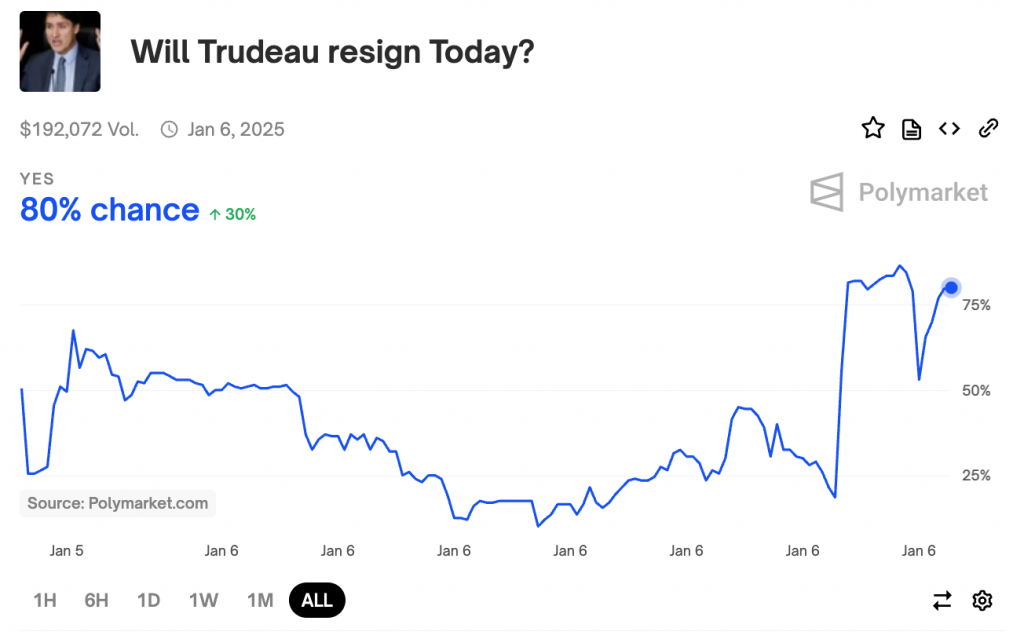Trudeau’s Big Announcement
On January 6, 2025, Canadian Prime Minister Justin Trudeau made waves with a major political announcement—he’s stepping down. The long-serving leader revealed that he would resign from his position as the head of Canada’s government once his party selects a successor. The decision follows months of speculation and mounting pressure, fueled by both internal party tensions and external criticism. But the twist? The resignation is not just making headlines in Canadian politics—it’s sparking a flurry of bets on platforms like Polymarket, where users have been placing wagers on the exact moment Trudeau would call it quits.
The Resignation Reveal: What Trudeau Said
During a January 6 press conference, Trudeau explained that the Liberal Party would undergo a “robust, nationwide, competitive process” to choose his replacement. The timing of the announcement seemed to coincide with increasing pressure from members of Parliament, many of whom had publicly called for him to step down. Just weeks before, Finance Minister Chrystia Freeland also made waves by announcing she would leave her position, citing disagreements with Trudeau over how to handle looming trade threats from the US.
Trudeau, addressing his decision with characteristic transparency, stated, “This country deserves a real choice in the next election, and it’s become clear to me that if I’m having to fight internal battles, I cannot be the best option for that election.” The comments hint at the fracturing within his own party and his acknowledgement that stepping aside might help clear the way for new leadership and fresh strategies.
The Legacy of Controversies and Criticism
Trudeau’s resignation is seen as the culmination of a series of political missteps that have dogged him over the years, including his handling of the 2022 trucker protests in Ottawa. The protests, which saw Canadian truckers block streets in opposition to COVID-19 restrictions, led to one of the most controversial moments of his tenure: invoking the Emergencies Act to freeze protesters’ bank accounts and monitor suspicious financial transactions—many of which were tied to cryptocurrency. The crypto community, in particular, saw this as an overreach of government power, and the incident has remained a flashpoint in ongoing debates about freedom, digital rights, and government control.
Polymarket Gets a Political Jolt
As soon as Trudeau’s resignation announcement hit the news, the political betting world went into overdrive—especially on Polymarket, a decentralized prediction market that allows users to bet on political outcomes. The odds for Trudeau resigning were already on the rise before his press conference, with many predicting that his resignation was imminent. In fact, users on the platform had been actively betting that Trudeau would step down by the end of the day, and their predictions came true almost to the minute.
Polymarket, which allows bettors to wager on a variety of political outcomes, saw massive activity on January 6, as Canadians and others around the world tried to capitalize on this moment of political uncertainty. The platform didn’t just allow bets on Trudeau’s departure—it also gave users the chance to predict who might be his successor. At the time, Conservative Party leader Pierre Poilievre was the clear favorite, with a hefty 91% chance of becoming Canada’s next prime minister after the upcoming election.

The Surge in Political Betting
Polymarket has seen significant activity in 2024, with political wagers ranging from the outcomes of the US election to who might be appointed to key positions in Donald Trump’s potential cabinet. Although US-based users are restricted from participating in these bets, the platform has still attracted a large and diverse user base. One interesting development has been the rise of “whales”—big bettors who are willing to put millions of dollars behind their predictions, potentially influencing the market’s odds.
In fact, the surge of high-stakes betting on Polymarket may have played a role in driving public interest and shaping the narrative around Trudeau’s resignation. With millions of dollars circulating on the platform, the speculative nature of these bets could have helped push the story into the spotlight, making it a hot topic for both casual observers and political analysts alike.
Political Betting Takes Center Stage
Trudeau’s resignation is more than just a turning point in Canadian politics—it’s a signal that the world of political prediction markets is becoming an increasingly important player in shaping the conversation around major political events. Whether you’re a Canadian political junkie or just someone looking to make a few bucks, platforms like Polymarket offer a fascinating glimpse into how people view the future of global politics. As for Trudeau, his resignation might be the beginning of a new chapter in Canadian politics, and a fresh opportunity for the Liberal Party to recalibrate and chart a new course. Only time will tell who will rise to the challenge—and whether the betting markets were right all along.
Final Thought: What’s Next for Polymarket?
With political betting on the rise and high-profile events like Trudeau’s resignation driving conversation, Polymarket and similar platforms will likely continue to gain traction. Whether you’re a bettor, a pundit, or just someone keeping an eye on the political landscape, it’s clear that these platforms are becoming a modern-day tool for shaping predictions—and potentially, history itself.



